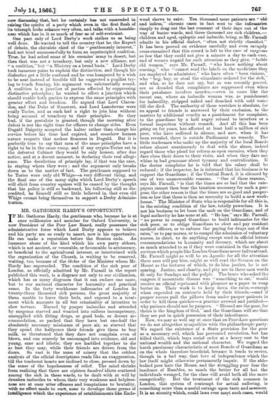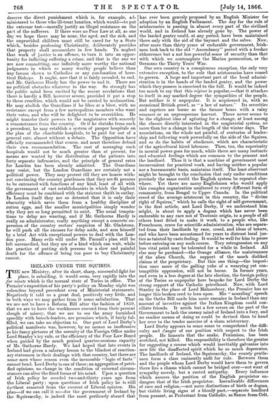31It. GATHORNE HARDY'S OPPORT1JNITY.
TP Mr. Gathorne Hardy, the gentleman who, because he is at
once millionaire and member for Oxford. University, is now President of the Poor Law Board, really possesses the administrative force which Lard Derby appears to believe and his party are so ready to assert, now is his opportunity. He can make a reputation before the Session ends. An immense abuse of the kin& which his own party abhors, which is not ancient, or venerable, or favourable to aristocracy, or beneficial to the agricultural interest, or intertwined with the organization of the Church, is waiting to be removed, waiting, too, because of the hiches of the Minister whom Mr. Hardy has, superseded. The condition of the sick poor of London, as officially admitted by Mr. Parnell in the report published this week, is a disgrace not only to our civilization, which has so many disgraces that it can endure one more, but to our national character for humanity and practical sense. In the forty workhouse infirmaries of London lie twenty-three thousand sick persons, the great majority of them unable to leave their beds, and exposed to a treat- ment which amounts in all but criminality of intention to slow torture. Nursed by pauper imbeciles and attended by surgeons starved and wearied into callous incompetency, unsupplied with fitting drugs, or good beds, or decent ac- commodation, so packed that they have but one-half the absolutely necessary minimum of pure air, so starved that they spend the halfpence their friends give them to buy milk, so threatened that they dare not complain even of blows, and can scarcely be encouraged into evidence, old and young, sane and idiotic, they are huddled together to die as best they may, while their friends are driven from the doors. So vast is the mass of misery that the coldest analysis of the official descriptions reads like an exaggeration, till the tenderest hearts are inclined to close, pressed down by the sense of the hopelessness of relief. The mind shrinks from realizing that there are eighteen hundred idiots scattered among the sick in these wards, to be dealt with at will by drunken imbeciles to whom their very weakness and helpless- ness are at once utter offences and temptations to brutality, with no effort made to cure, none to develope those germs of intelligence which the experience of establishments like Earls-
wood shows to exist. Ten thousand., more patients are "old.' and infirm," chronic cases in fact sent to the infirmaries simply to drag out the last remnant of their days out of the
way of busier wards, and. three thousand are sick children,—
children and aged, epileptic and imbecile, being, as Mr. Parnell admits in his official dialect, "often not strictly classified."
It has been proved on evidence carefully and even savagely cross-examined that this crowd is left to the care of surgeons so few that they could not give a minute a day to each case, and of women unpaid for such attention as they give, "feeble old women," says Mr. Parnell, "who know nothing about nursing," who "cannot read the labels on the medicines they are employed to administer," who have often been vicious," who "beg, buy, or steal the stimulants ordered for the sick," and who, as he does not say, but as was recently proved, are so dreaded that complaints are suppressed even when their petulance involves murder,—even in cases like the recent one, where an imbecile woman was, as punishment for imbecility, stripped naked and douched with celd water till she died. The authority of these wretches is absolute, for an appeal to friends is answered by their exclusion, ta the masters by additional cruelty as a punishment for complaint, to the guardians by a half angry refusal to interfere or a formal inspection without remark. And all this has been going on for years, has affected at least half a million of sick poor, who have suffered in silence, and now, when it has been revealed, there is outside Parliament no remedy. The little tradesmen who make up the majority of the local Boards refuse almost unanimously to deal with the abuse, indeed regard those who plead for reform as open enemies, when they dare close their doors to their visits, and when they dare not whine in. bad grammar about tyranny and centralization. If the doctor complains he is told that his salary shall be reduced ; if the inspector, he is informed that his business is to support the Guardians ; if the Central Board, it is silenced by one of two unanswerable reasons. "One of these reasons," says Mr. Parnell, "is that the times are so bad that the rate- payers cannot then bear the taxation necessary for such a pur- pose, the other reason is that the times are so good and pauper- ism so low that there is then no necessity to build a new work- house." The Minister of State who is responsible for all this is, in the existing condition of the law, totally powerless. It is not his business to let loose the mob on the Guardians, and of legal authority he has none at all. "Re has," says Mr. Parnall, "no power to compel Guardians to build infirmaries for the sick poor, or to oblige Guardians to elect and pay resident medical officers, or to enforce the paying for drugs out of the rates," or to pay nurses, or to compel the admission of voluntary nurses, in short, to do anything except send in official letters recommendations to humanity and decency, which are about as much attended to as if they were contained in the religious services which people like London Guardians never fail to attend.
Mr. Parnell might as well be an Apostle for all the attention these men will pay him, might as well read the Sermon on the Mount as the lectures of which, to do him justice, he is not sparing. Justice, and charity, and pity are to these men words fit only for Sundays and the pulpit. The brute who asked the surgeon if mesenteric disease was "something to eat," would receive an official reprimand with pleasure as a paper to wrap butter in. Their work is to keep down the rates,—except when expended on contracts held by their friends,—and if pauper nurses pull the pillows from under pauper patients in order to kill them quicker—a practice avowed and justified— why patients should not be paupers. "Blessed are the poor, for theirs is the kingdom of God," and the Guardians will see that they are put in quick possession of their inheritance.
Now, we may as well say at once that on Poor-Law questions we de not altogether sympathize with the philanthropic party.
We regard the existence of a State provision for the poor as a necessary evil, which has prevented revolution, but has killed thrift, which buys social order at a heavy cost to the national wealth and the national character. We regard the harsh parsimony characteristic of most Boards of Guardians as on the whole therefore beneficial, because it tends to revive, though in a bad way, that love of independence which the law itself might otherwise permanently impair. If the able- bodied poor hate the House, and the struggling poor fear the insolence of Bumbles, so much the better for all but the individuals wronged, for the class will avoid both all the more energetically. But the treatment of the sick common in London, this system of contempt for actual suffering, is something more than &useful outrage upon taste and_manners. It is an atrocitx-which, could laws ever meet such cases, would deserve the direct punishment which is, for example, ad- ministered to those who ill-treat lunatics, which would—to put the extreme test—morally justify an illegal resistance on the part of the sufferers. If there were no Poor Law at all, as one day we hope there may be none, the aged, and the sick, and the unprovided children must still be cared for by a State which, besides professing Christianity, deliberately provides that property shall accumulate in few hands. To neglect that work of justice is an offence, to turn it into an oppor- tunity for inflicting suffering a crime, and that is the one we are now committing, one infinitely more worthy the national judgments in which so many worthy people believe than any favour shown to Catholics or any condonation of here- tical Bishops. It ought, now that it is fairly revealed, to end, and Mr. Gathorne Hardy has the power to end it. There are no political obstacles whatever in the way. So strongly has the public mind been excited by the recent revelations that there is hardly a Bill, however severe, provided it put a stop to these cruelties, which would not be carried by acclamation. He may abolish the Guardians if he likes at a blow, with no resistance except from a few metropolitan members who want their votes, and who will be delighted to be overridden. He might transfer their powers to the magistrates with scarcely a remonstrance from the country. Or if he shrinks from such a precedent, he may establish a system of pauper hospitals on the plan of the charitable hospitals, to be paid for out of a general rate, almost without a debate. The Opposition have officially recommended that course, and must therefore defend their own recommendation. The cost of managing such hospitals would not be much greater than at present, for means are wasted by the distribution of the patients into forty separate infirmaries, and the principle of general rates for London has been already admitted. The Guardians may resist, but the London Guardians are certainly not a political power. They may protest till they are hoarse with- out convincing the country gentlemen that they are fit persons to be entrusted with functions of any kind, least of all with the government of vast establishments in which the highest efficiency must be combined with the strictest thrift in outlay. In London itself they are so detested that it is only their obscurity which saves them from a healthy discipline of rotten eggs, and the smaller municipalities simply wonder why they are so long permitted to exist. The usual tempta- tions to delay are wanting, and if Mr. Gathorne Hardy is really an administrator, really anything except a concrete ex- pression of the country rectors' suspicion of Mr. Gladstone, he will push all the excuses for delay aside, and arm himself by a brief Act with exceptional powers to deal with the Lon- don poor. Many evils will under Mr. Farnall's plan still be left unremedied, but they are of a kind which can wait, while the practice of putting sick persons to a slow and painful death for the offence of being too poor to buy Christianity cannot.































 Previous page
Previous page